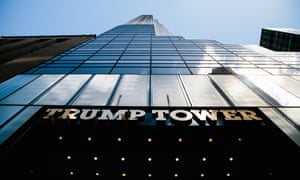If there is a silver lining to the confusion and disappointment of
Russiagate, it is that we can now pay attention to the real fleecing
It’s a fortunate thing for Donald Trump
that the Democrats, and much of the media, spent the past two years
focused on the narrow question of whether his 2016 campaign actively
colluded with Russian agents to hack his opponents’ emails. Were it not
for this singular obsession, we might have come to appreciate the full
scope of graft, influence peddling and petty theft that has made this
the most crooked administration in US history.
One doesn’t have to go to Moscow to see it; pick almost any country
in the world. Take my former home, Panama, famous for its canal and
secret banks. Towering over the Panama City skyline is a 70 story
hotel-casino shaped like a sailboat formerly known as the Trump Ocean
Club. Trump had gifted it to his daughter Ivanka as her first real
estate deal, which court records show earned Trump between $30m and $50m. Ivanka Trump put in charge of its sales a Brazilian financier, whom a Reuters investigation identified as an admitted money launderer with ties to Russian organized crime, who would later be arrested for fraud and forgery.A Global Witness report turned up evidence the hotel project was being used to launder “proceeds from Colombian cartels’ narcotics trafficking”. When the hotel’s owners decided the Trump name was bad, even for business this shady, and ended their contract with his organization, Trump’s lawyers asked Panamanian president Juan Carlos Varela to intervene on Trump’s behalf.
In an erratic first term characterized by organizational chaos and constant turnover, the most consistent feature of the Trump presidency has been his use of office for personal enrichment. The Argentinian press reported that Trump asked President Mauricio Macri to resolve construction delays for a Trump building in Buenos Aires; both presidents denied the report, but construction resumed within days of their call.
In India, Trump made licensing deals for buildings owned by Mangal Prabhat Lodha, a lawmaker and the vice-president of the ruling party, the BJP. Lodha’s partners met with Trump shortly after his election to discuss “US-India relations”. Trump’s son-in-law Jared Kushner has leveraged his somehow accepted position as acting secretary of state to win investments from the Chinese and Qatari governments in his own real estate business.
Meanwhile, Ivanka Trump has won licensing deals for her clothing line in China, which her father had labelled a currency manipulator before warming to president Xi, coincidentally just after the Chinese government approved trademarks for his and Ivanka Trump’s companies.
For legal scholars, the question of what to make of these gross conflicts of interest is a technical one: do they violate the constitution’s so-called emoluments clause, barring presidents from accepting “any present, emolument, office, or title” from foreign states? Constitutional originalists argue that emoluments, as the framers envisioned, had a narrow definition that do not include licensing fees for fashion companies and hotel-casinos, which is as tautological a defense as the fact that Trump has not been named a duke of the Habsburg Empire.
But there’s a simpler term for this: public corruption. It’s broader than hacking, and it’s well documented, if not nearly as breathlessly discussed on cable news.
The activist group Public Citizen collected records of over $15m Trump raked in from government agencies and political organizations such as the Pentagon, National Security Council, Republican National Committee and taxpayer dollars, which were spent money on everything from Trump restaurants to golf carts at Mar-a-Lago. Trump’s hotels have become an easy conduit for money from lobbyists both foreign and domestic. The Trump family business has earned a quarter million dollars in hotel fees from the Saudi government alone, another state Trump railed against on the campaign trail and made nice with once in office.
The big money comes from commercial tenants in Trump properties, which Forbes has estimated earns the president $175m a year, and include a Chinese state bank which rents a $2m office space in New York’s Trump Tower. Despite a much-hyped trade war with China, Trump is famously indebted to Chinese state banks, and two days after the Trump Organization received a $500m loan from the Chinese government, Trump announced he would lift sanctions against a Chinese telecom business. His tariffs also selectively excluded the country’s apparel industry, from which his daughter’s company imports its clothes.
Perhaps what has made these ongoing grifts so easy to overlook is that they are so unimaginative. There’s no grand conspiracy, no chalkboard linking spymasters to sleeper agents. What made Russiagate so seductive as the alpha and omega of Trump’s malfeasance was its promise that his very presence in office was illegitimate, that his misdeeds could be blamed on shadowy foreign forces rather than the country’s existing prejudices and mistrusts they exploited.
The Trump campaign’s defense was one of uncharacteristic humility: that it was too disorganized to carry out a conspiracy of the ages, and it’s a plausible argument. Real malfeasance is boring and obvious: sleaze your way into power and line your pockets while you have it. The Trump family is perfectly capable of that. It sees the presidency simply as a vehicle to extract maximum rents. If there is a silver lining to Russiagate’s anticlimactic conclusion, it should be to free up some attention for the real fleecing that’s going on, one that Congress has, until recently, been too distracted to stop.

No comments:
Post a Comment